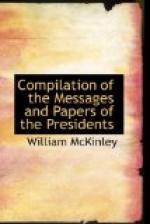No single great material work which remains to be undertaken on this continent is of such consequence to the American people as the building of a canal across the Isthmus connecting North and South America. Its importance to the Nation is by no means limited merely to its material effects upon our business prosperity; and yet with view to these effects alone it would be to the last degree important for us immediately to begin it. While its beneficial effects would perhaps be most marked upon the Pacific Coast and the Gulf and South Atlantic States, it would also greatly benefit other sections. It is emphatically a work which it is for the interest of the entire country to begin and complete as soon as possible; it is one of those great works which only a great nation can undertake with prospects of success, and which when done are not only permanent assets in the nation’s material interests, but standing monuments to its constructive ability.
I am glad to be able to announce to you that our negotiations on this subject with Great Britain, conducted on both sides in a spirit of friendliness and mutual good will and respect, have resulted in my being able to lay before the Senate a treaty which if ratified will enable us to begin preparations for an Isthmian canal at any time, and which guarantees to this Nation every right that it has ever asked in connection with the canal. In this treaty, the old Clayton-Bulwer treaty, so long recognized as inadequate to supply the base for the construction and maintenance of a necessarily American ship canal, is abrogated. It specifically provides that the United States alone shall do the work of building and assume the responsibility of safeguarding the canal and shall regulate its neutral use by all nations on terms of equality without the guaranty or interference of any outside nation from any quarter. The signed treaty will at once be laid before the Senate, and if approved the Congress can then proceed to give effect to the advantages it secures us by providing for the building of the canal.
The true end of every great and free people should be self-respecting peace; and this Nation most earnestly desires sincere and cordial friendship with all others. Over the entire world, of recent years, wars between the great civilized powers have become less and less frequent. Wars with barbarous or semi-barbarous peoples come in an entirely different category, being merely a most regrettable but necessary international police duty which must be performed for the sake of the welfare of mankind. Peace can only be kept with certainty where both sides wish to keep it; but more and more the civilized peoples are realizing the wicked folly of war and are attaining that condition of just and intelligent regard for the rights of others which will in the end, as we hope and believe, make world-wide peace possible. The peace conference at The Hague gave definite expression to this hope and belief and marked a stride toward their attainment.




